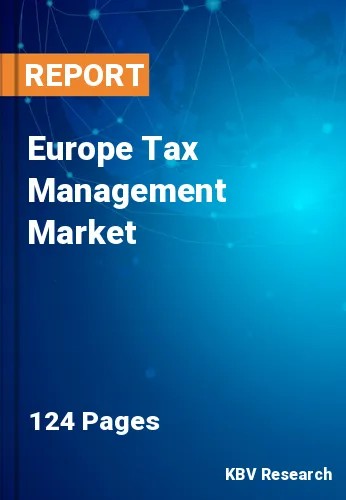The Europe Tax Management Market would witness market growth of 9.9% CAGR during the forecast period (2021-2027).
Blockchain, a distributed ledger technology, is being used in a variety of industries, including aviation, automotive, agricultural, manufacturing, and banking. It's utilized to keep track of health, property, bank transactions, and supply chain information. In addition, companies reap multiple benefits such as improved accuracy, decentralization, security, and transparency, by adopting blockchain. Moreover, the use of blockchain for tax compliance will create a shared blockchain between the taxpayer and the tax administration. This will aid the transition from the present periodic technique to real-time tax information sharing.
In the banking sector, technological advancements and digital innovation have resulted in significant advances in system connectivity, processing power, cost, and freshly generated and useful data. These enhancements have decreased the transaction costs while also rolling new business models and enabling the entry of new players in the industry. Technology has boosted information interchange while also lowering transaction costs, resulting in a higher transaction rate. Due to the increased use of mobile and tablet devices, it is now possible for any entity to conduct financial transactions using their smartphone or tablet.
The EU continues to have much higher tax income than other advanced nations. In 2019, tax revenue in the EU accounted for 40.1 percent of total GDP (GDP). In the EU, the taxation system remained steady. Indirect taxes, direct taxes, and social contributions all contributed nearly equally to revenue. Environmental levies in the EU were mostly steady in 2019. However, there have been some substantial developments at the national level over the recent decade. Several countries greatly raised their environmental revenues during that time, owing to energy-related revenues in particular. To manage these processes related to taxation, many countries are increasingly adopting tax management solutions to reduce the time and effort.
The Germany market dominated the Europe Tax Management Market by Country 2020, and would continue to be a dominant market till 2027; thereby, achieving a market value of $2,276.5 million by 2027. The UK market is anticipated to grow at a CAGR of 9.1% during (2021 - 2027). Additionally, The France market would display CAGR of 10.7% during (2021 - 2027).
Based on Component, the market is segmented into Software and Services. Based on Tax Type, the market is segmented into Indirect Tax and Direct Tax. Based on Deployment Type, the market is segmented into Cloud and On-premise. Based on Organization Size, the market is segmented into Large Enterprises and Small & Medium-sized Enterprises (SMEs). Based on End User, the market is segmented into BFSI, IT & Telecom, Retail, Healthcare, Energy & Utilities, Manufacturing, and Others. Based on countries, the market is segmented into Germany, UK, France, Russia, Spain, Italy, and Rest of Europe.
Free Valuable Insights: The Global Tax Management Market Size will Hit $33.9 Billion by 2027, at a CAGR of 10.7%
The market research report covers the analysis of key stake holders of the market. Key companies profiled in the report include Avalara, Inc., Blucora, Inc., H&R Block, Inc., Sovos Compliance, LLC, Vertex, Inc., ADP, Inc., SAP SE, Intuit, Inc., Thomson Reuters Corporation, and Wolters Kluwer N.V.
By Component
By Tax Type
By Deployment Mode
By Organization Size
By End User
By Country
Our team of dedicated experts can provide you with attractive expansion opportunities for your business.

